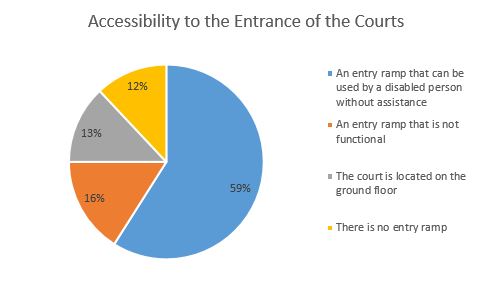The
Open the Windows Association published its research on past experiences and initiatives to ensure accessibility and inclusiveness of the courts in Macedonia.
A survey was conducted within the framework of the research by submitting a questionnaire to the institutions. Persons with disabilities were given the role of researchers in light of the slogan NOTHING FOR US, WITHOUT US, and visited the courts and conducted interviews with contact persons proposed by these institutions. The survey questionnaire was filled in and submitted by 32 (94%) out of 34 courts that exist on the territory of Macedonia.
External accessibility
Regarding the external accessibility of the court, 28% of the courts stated that they do not have access ramps, or are not adequate to the needs of persons with disabilities.
 Internal accessibility
Internal accessibility
The internal adaptation of the courts for the needs of persons with disabilities is at an unsatisfactory level. Only two courts in the country have an appropriate toilet for disabled people, and none has a tactile paving, or labels in the Braille Alphabet. See the table below.
| Type of adaptation provided by the court |
Number of Courts |
Percentage Representation |
| Access ramp at the entrance of the court |
24 |
75% |
| Elevator |
4 |
12% |
| Premises located on the ground floor |
16 |
50% |
| Adapted toilet |
2 |
6% |
| Marked tactile paving |
0 |
0% |
| Labels in Braille |
0 |
0% |
| Provided companion for the visually impaired |
14 |
44% |
| Provided interpreter for sign language |
8 |
25% |
In order to facilitate communication and support for persons with disabilities, 81% of the courts have a contact person for issues and services related to persons with disabilities.
Conclusions
According to the received data and in accordance with the Law on Prevention and Protection against Discrimination, which in Article 8, Paragraph 2 states that
"Discrimination of persons with mental and physical disabilities exists even when measures for eliminating the restrictions would not be taken, that is, adjusting infrastructure and other premises, use of publicly available resources, or participation in public and social life.", we come to the conclusion that
persons with disabilities face discrimination, because of the lack of adequate conditions and accessibility, on the path to realizing access to justice.
During the research, Open the Windows established cooperation with the courts, and the process occurred without difficulty. The whole research can be found below.
The research of the Open the Windows Association is made as part of the project "Network 23+", funded by the European Union.